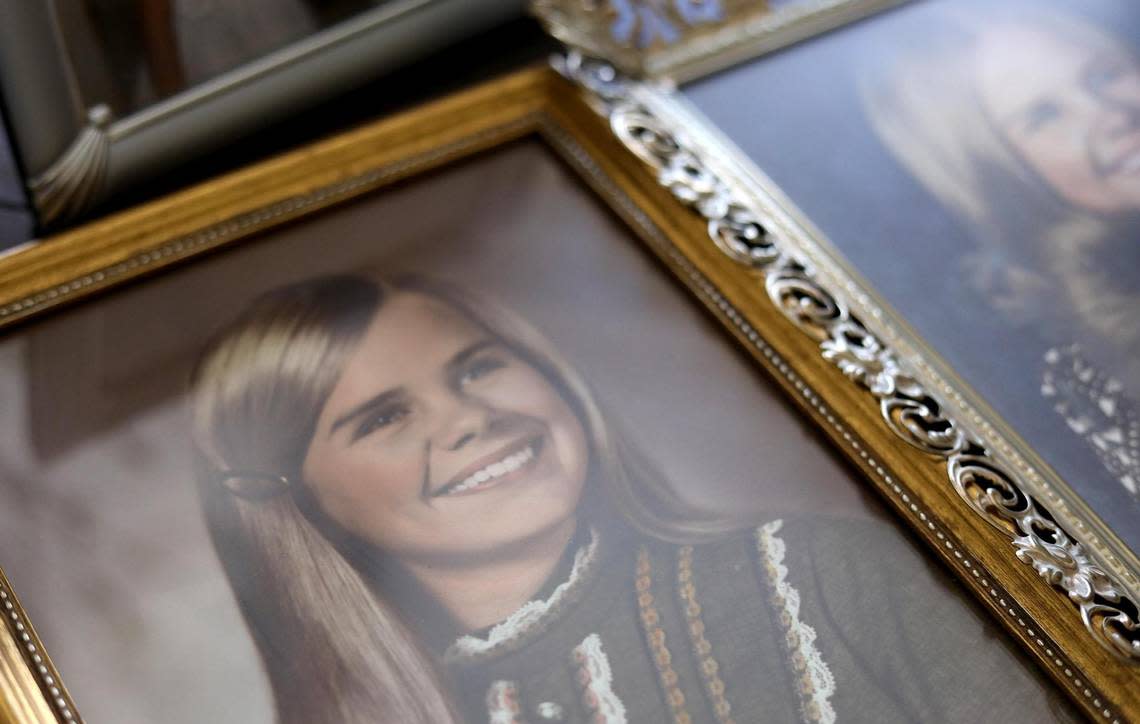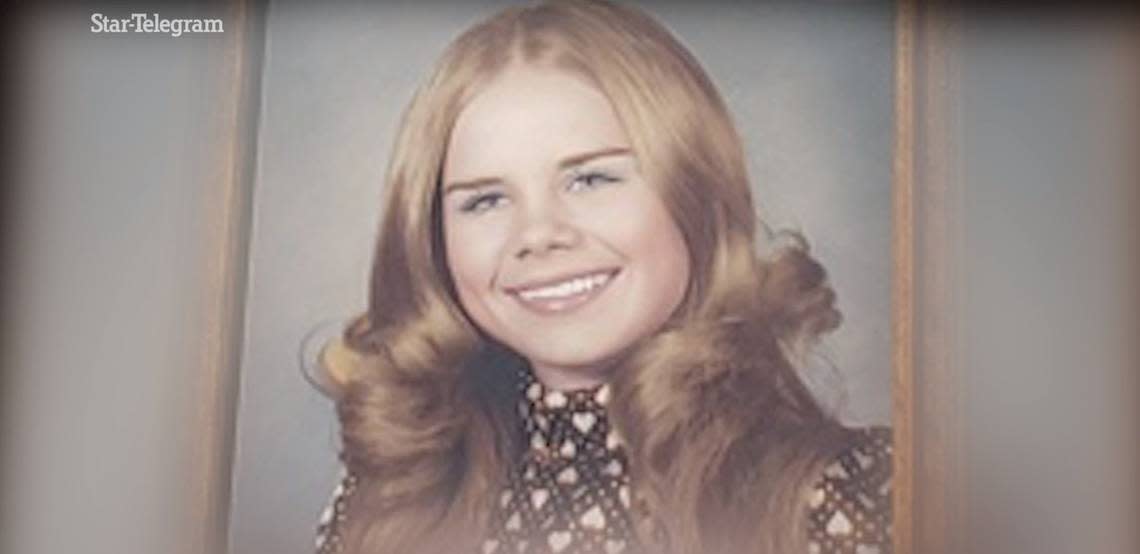Carla Walker’s murderer died in prison. Police investigated him as possible serial killer
The man who in 1974 murdered 17-year-old Carla Walker in Fort Worth died in prison in July after less than three years of incarceration, but detectives aren’t done investigating if and how he may be connected to other unsolved murders.
Glen McCurley, 80, died of natural causes while serving a life sentence without the possibility of parole at the Telford state prison in Bowie County. He was convicted of Walker’s murder in August 2021.
Walker, a 17-year-old Western Hills High School cheerleader, was kidnapped by McCurley on Feb. 17, 1974. McCurley had been out drinking and driving around Fort Worth that night when he came across Walker and her boyfriend, who were parked outside a bowling alley. McCurley attacked the boyfriend and abducted, raped and murdered Walker.
Her body was found on Feb. 19, 1974, in a ditch south of Fort Worth. Walker had been strangled.
Forensic genealogy, using DNA collected in 1974, was what eventually led investigators to identify McCurley as the killer. He pleaded guilty to the murder nearly half a century later, midway through his trial.
Carla’s brother, Jim Walker, was 12 when his sister was killed. He said he hopes the fact that McCurley died in prison — after Carla’s murder went unsolved for nearly 50 years — will encourage other families of cold case victims not to give up.
“We did our job to get Carla’s perpetrator caught and brought to justice and it worked out the way it probably should have worked out,” Jim Walker told the Star-Telegram this week. “We feel for his son, ... but we do feel that justice was served.”

But Carla Walker might not have been McCurley’s only victim.
Detectives with the Fort Worth Police Department have been looking into other unsolved homicide cases for possible connections to McCurley. In a video-recorded interview after his arrest, cold case Detectives Jeff Bennett and Leah Wagner asked McCurley if he had killed before or since taking Carla’s life. And following McCurley’s conviction, the detectives told reporters that they were investigating whether McCurley had any ties to a handful of other killings.
A detective with the cold case unit couldn’t immediately be reached for comment on the status of those investigations, but Jim Walker said he suspects McCurley didn’t kill only once.
While he’s not law enforcement, Jim Walker has been involved in assisting police in investigating cold cases. For decades, he was in close contact with detectives, urging them to remember his sister and continue their investigation. With around 1,000 unsolved murders in Fort Worth, Jim Walker said he knew he had to build bridges with detectives, and then keep those bridge in good shape.
Now Jim Walker works to raise money for cold case investigations and is advocating for the Carla Walker Act both in Texas and in Congress. The law would set aside money for DNA testing in cold cases as an annual line-item in the budget.
Potentially more victims
Through his connections to cold case investigators, Jim Walker knows police have suspicions that McCurley may have been a serial rapist or a serial killer.
And criminal experts agree with that possibility.
The way McCurley abducted, raped and killed Carla Walker indicates a pattern to some experts.
Kim Rossmo, director of the Center for Geospatial Intelligence and Investigation at Texas State University, told the Star-Telegram in 2021 that the MO in Carla Walker’s death suggests someone who hasn’t only offended once.
“This is certainly a pattern of someone that has the characteristics of someone who could reoffend versus the typical murderer who does not,” Rossmo said.
Without further investigation, though, Rossmo said at the time that was nothing but speculation.
It’s unclear if investigators conducted a psychological evaluation on McCurley before he died. If they didn’t, it will be more difficult to determine if McCurley had the capacity to be a repeat rapist or killer.
Certain details of the crime suggested to experts that Carla Walker may not have been McCurley’s only victim. The fact that the killer and victim were strangers is one such indicator. But, by itself, that’s enough to determine whether he attacked others, Dr. Bryanna Fox, a professor in the Department of Criminology at the University of South Florida, told the Star-Telegram in 2021.
Most murderers know their victims and the killing is a one-time situation, Fox said.
“Other people are more intrinsically motivated to commit these crimes,” Fox, who is a former FBI special agent, said. “They are satisfying an urge to commit the crime; they commit the crime but the urge comes back.”
Rossmo suggested that McCurley’s “urge” may have been motivated by sex or power. When the motivation behind a killing or other violent crime seems linked to an urge, he said, it is likely the perpetrator did it more than once.
When a crime against a stranger involves rape or sexual assault, Rossmo said, “you would certainly want to explore the possibility that the individual had done something else.”
McCurley killing Carla Walker by strangulation could also indicate she wasn’t his only victim.
Strangulation is an unusual and difficult way to kill someone, Fox explained.
“(Strangulation) almost exclusively happens between people who know each other,” she said. “We typically can’t get quite that angry at strangers. Strangers tend to pull a gun. With strangulation, that person has to be so mad or so committed... that person has to persist when the person is very aggressively trying to get themselves free.”
Other Fort Worth women strangled
Several unsolved killings in the 1970s and ‘80s have similarities to Carla’s murder, including two women were strangled in the ‘70s during the month of February.
Becky Martin, a Tarrant County Junior College student, was kidnapped from the college on Feb. 7, 1973 — one year and 10 days before Carla was killed. Martin’s skeletal remains were found weeks later in a culvert in west Fort Worth, according to police cold case records.
In Feb. 18, 1977, the body of 25-year-old June Ward was found lying next to the curb in the 1000 block of West Fuller Avenue in south Fort Worth. She had been strangled. Her car was found at 4800 South Freeway, according to cold case records, and police believe she had gone to look for help after she had car trouble near a parking lot. The case was reopened in 2011 but is still unsolved.
In her victim impact statement during McCurley’s sentencing, Cindy Stone, Carla’s sister, looked down at McCurley from the witness stand and told him the decades-long pain he caused her family.
“I just ask you, if you have done this to anybody else, confess,” she said. “Because you have nothing to lose. And you have no idea what you’re doing to other families and your family. And it needs to end now.”
The Carla Walker Act
The Carla Walker Act, which will be sponsored in the Senate by Sen. John Cornyn, R-Texas, would set aside funding in the annual federal budget to assist law enforcement in obtaining DNA testing for cold cases. The bill was introduced last year to the House by Rep. Kelly Armstrong, R-North Dakota.
The bill would provide at least $5 million a year to fund federal grants to law enforcement for DNA testing. Jim Walker said that if the bill passes, he expects to see a massive number of violent offenders charged and convicted of cold cases in jurisdictions that didn’t previously have access to DNA forensic testing or forensic genealogy.
“If you’re a bad man or woman and you killed someone 15 or 20 years ago, anything short of incinerating the body, the Carla Walker Act makes it a case not of if we catch you but when,” Jim Walker said.

The bill was inspired by the fact that Carla’s killer was identified by investigators with the help of forensic genealogy DNA testing, through which investigators can identify someone using a DNA profile and genealogical records to trace close relatives. Similar methods have seen killers identified, charged and convicted in recent years.
Convictions included those of Joseph James DeAngelo Jr., more widely known as the Golden State Killer, and Lonnie David Franklin Jr., better known by the moniker Grim Sleeper, both in California.
Whether the bill passes or not, Jim Walker told the Star-Telegram he urges families of the victims of other unsolved murders to keep hope alive. Stay in touch with investigators and see if there are any ways you can help them, he said.
“Don’t let the bad guy win,” Jim Walker said. “He started the fight — we can finish the fight.”
This story contains information from the Star-Telegram’s archives.
